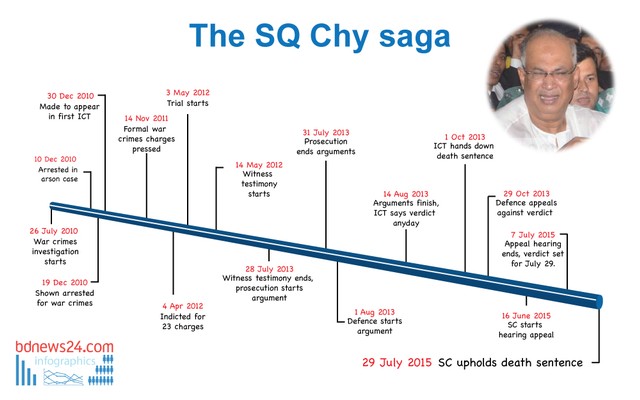War-time terror of Chittagong Salauddin Quader Chowdhury will have to hang after the Supreme Court in the final verdict has confirmed the death penalty of the war crimes tribunal.
The four-member appeals bench led by Chief Justice Surendra Kumar Sinha delivered the final verdict just after 9am on Wednesday.
The judgment was greeted with huge relief in and outside the courtroom.
Many had their doubts about the death sentence being upheld following a report in a foreign media over an alleged meeting between Chowdhury’s family and the chief justice.
The three other judges of the bench were Justice Nazmun Ara Sultana, Justice Syed Mahmud Hossain and Justice Hasan Foez Siddique.
Ever at the centre of controversy with his remarks and actions, Chowdhury is the first BNP leader to be walking the gallows for atrocities during the 1971 War of Independence from Pakistan.
He is the second former minister to have the death sentence upheld after Jamaat-e-Islami’s Ali Ahsan Muhammad Mujahid.
During the trial, Salauddin Quader Chowdhury’s role in the large-scale killing of Hindus and Awami League activists during the 1971 Liberation War was recounted in some detail.
He is the eldest son of the former Muslim League leader Fazlul Quader Chwodhury.
The International Crimes Tribunal-1 sentenced him to death on Oct 1, 2013, for murdering Kundeshwari Oushadhalaya owner Nutan Chandra Singha, genocide of Hindus at Sultanpur and Unsattar Parha, and abduction and murder of a Hathazari Awami League leader and his son Sheikh Alamgir.
The Appellate Division has now confirmed the tribunal’s verdict after a year and nine months.
Chowdhury is the fifth to get a verdict on the appeal against the tribunal’s judgment. He was at Kashimpur Jail in Gazipur.
The appeal verdict
The top court’s verdict upheld the death penalty awarded by the war crimes tribunal in charges 3, 5, 6 and 8 that include murder, genocide and abduction for murder.
The 20-year prison sentence given by the tribunal in charges 2 and 4 were also upheld.
The former BNP MP was, however, acquitted of charge 7, for which the tribunal had ordered a 20-year prison term.
The tribunal’s verdict of five-year prison terms for charges 17 and 18 were also upheld by the Supreme Court.
The war crimes tribunal had found Chowdhury guilty in nine out of the 23 charges levelled against him by the prosecution.
Wednesday’s final verdict by the apex court acquitted him from one of the nine charges and upheld the sentences by the tribunal in the remaining eight charges.
Reactions
After the verdict, Attorney General Mahbubey Alam said that the verdict has fulfilled their expectations.
Dissatisfied over the verdict, Chowdhury’s lawyer Khandker Mahbub Hossain said that they will seek a review after the full verdict is published.
Chowdhury’s family maintains he is innocent.
“My father is innocent and we hope one day it will be proved,” son Hummam Quader Chowdhury told reporters after the verdict.
What happens now
In line with the rules, the Supreme Court will now publish the full verdict and send it to the tribunal, which will then issue the death warrant.
After getting the warrant, the jail authorities will read it out to Chowdhury.
The defence will get the chance to file a review petition within 15 days from the publication of the full verdict.
The court will agree to rethink the ruling only if it doubts the verdict’s ‘reliability’ or if there are chances of a miscarriage of justice.
But the review will never be equated to an appeal, the court said in the review verdict of Jamaat’s Abdul Quader Molla.
Once the review petition is resolved and the death sentence is upheld, the war crimes convict will have the opportunity to seek mercy from the president and meet family members.
If Chowdhury is denied pardon or if he declines to appeal for his life, the government will execute the convict through the jail authorities.
This procedure was followed during the execution of Jamaat leaders Molla and Mohammad Kamaruzzaman.
Source: Bd news24

